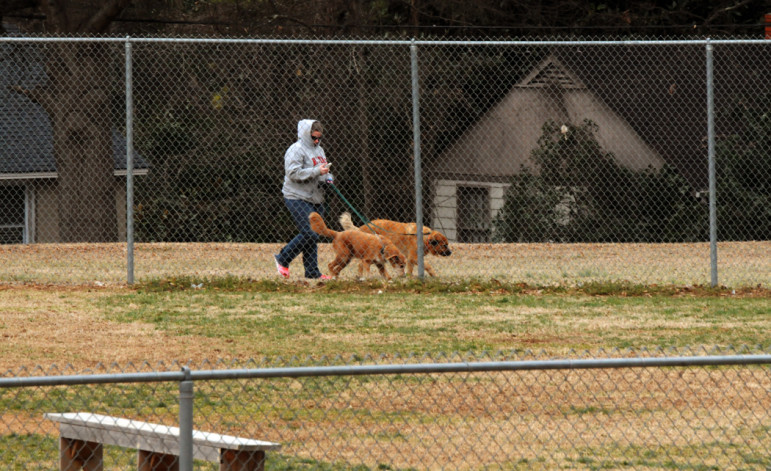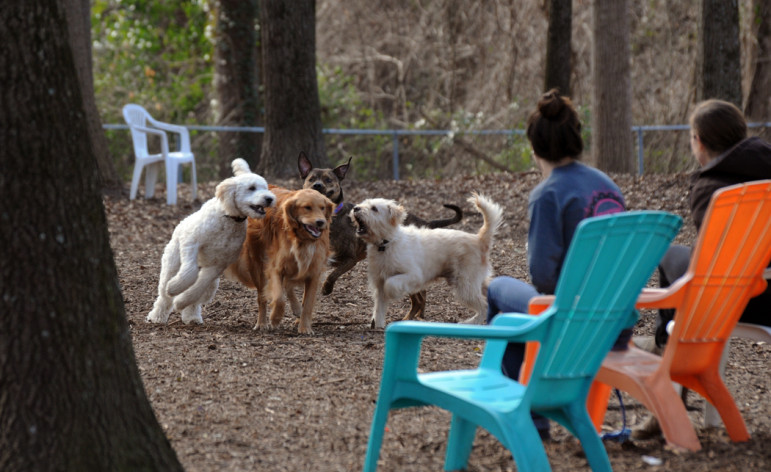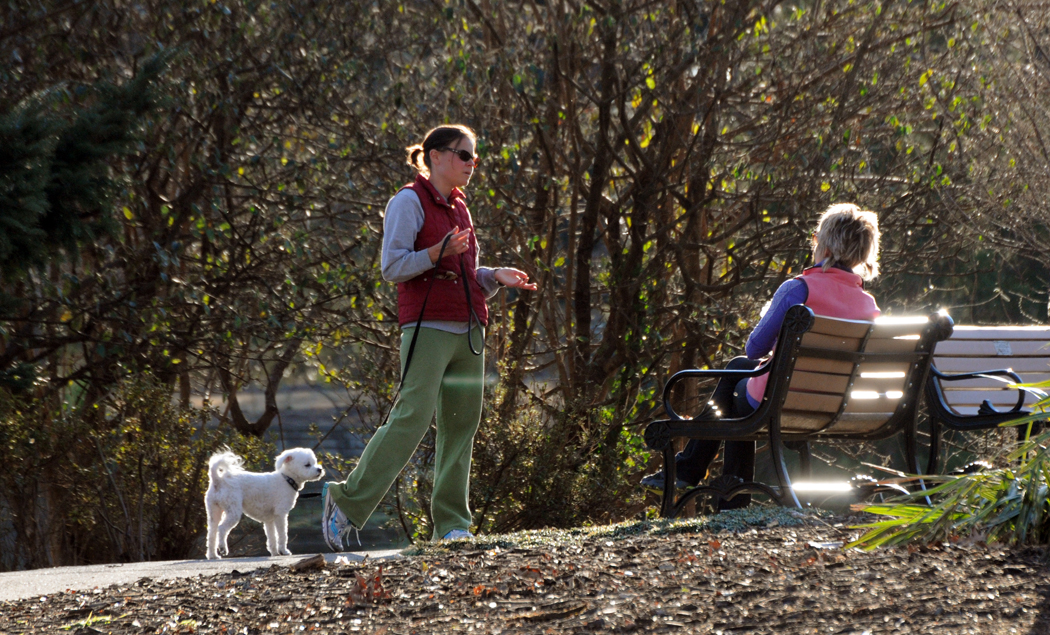Dog lovers will have to wait at least another week for a decision on a proposed dog ban in certain park facilities, including playgrounds and sports fields.
After two hours of discussion Tuesday, the three-member Public Works Committee reported the issue back to the full City Council without any recommendation.
If approved, the ban will prohibit dogs from specific areas of Raleigh’s parks, including playgrounds and ball fields, two areas most associated with complaints. Leashed dogs would still be allowed in general areas of the parks and greenways.
The city already has a law on the books that states that no dog should be unleashed on public property, except in but dog parks.

Karen Tam / Raleigh Public Record
A woman walks her two dogs on the outside of the fence around Oakwood Park's baseball fields.
Parks and Recreation Department staff said the change stemmed from complaints about dog feces being left on the fields and unleashed dogs coming into contact with other people in parks. The majority of the complaints have been about dog owners not picking up dog waste.
Parks Superintendent Wayne Schindler said other incidents included owners putting their dogs on playground equipment and owners letting their dogs run and defecate on ball fields in parks located near dog parks.
Schindler said that one park maintenance worker complained that while he was collecting trash at Marsh Creek Park, he was confronted by an aggressive dog that would not respond to its owner’s calls.
While park staff has been able to collect some anecdotal evidence of the problems, hard data is much more difficult to obtain. Councilor Wayne Maiorano asked staff if they were able to collect quantifiable data that showed how bad the problem is or if there are any parks that are worse than others.
Park staff was able to collect dog-bite data from animal control, but the numbers could not provide accurate locations of where the bites happen. Schindler said that the data only show where the call came from — not where the bite originated.
Councilor John Odom said he is in favor of staff’s recommendation, but saw it as an enforcement nightmare.
“I see us implementing this, but I don’t know how we’re going to enforce it,” he said.
The animal control unit of the Raleigh Police Department only has 11 officers for the entire city. Officers are responsible for wild animal calls as well as pets.
“We’ve already got certain restrictions but the behavior is still occurring,” Maiorano said.
A handful of dog owners spoke out against the prohibition and asked for some kind of compromise.
“I don’t seen an issue if my wife takes our dogs and we run them in the park for 15 minutes at 10 a.m. when no one is out there,” said resident and dog owner Dave Lipton.
He said the major issue is timing.
While athletics are the fields’ priority use, many residents who spoke requested access when the fields are empty.
Dog Parks
Part of the issue, they said, is the lack of existing dog parks. The parks that are available are often crowded, forcing many dog owners, especially those that live in apartments or condos, to look for alternatives.
The city has three dog parks: Carolina Pines, Millbrook and Oakwood. Dog parks are included in the park master plans for Buffalo Road Athletic Park and Leesville Road Park, but there is currently no funding for construction.
Portland, Ore. for example, also prohibits dogs from court areas and athletic fields, but the city boasts 55 dog parks.

Karen Tam / Raleigh Public Record
People at Oakwood Dog Park watch their dogs cavort on sunny Monday.
Maiorano asked how difficult it would be to carve out an area of an existing park for dogs to run freely.
Adding a dog park, or even a fenced area dedicated to dogs, would require an amendment to the park’s master plan. The amendment would include a public input process, which hasn’t gone well in the past.
Parks and Recreation Director Diane Sauer said people love and want dog parks, “but when they’re put in a park master plan, it’s ‘not in my backyard.’”
Allowing fields to be used as temporary dog parks during off hours would also require a master plan amendment.
Committee members agreed that the conversation needed to be continued, but thought they had enough information to bring the issue back to the full Council.
The next City Council meeting will take place Feb. 18.
